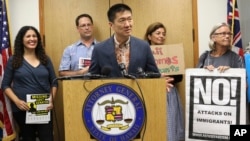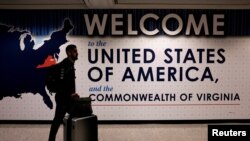The U.S. State Department said Friday that it is reviewing a ruling by a federal judge that may allow thousands more travelers and refugees excluded from the United States by a presidential order to obtain travel documents.
In late June, the U.S. Supreme Court said part of President Donald Trump's executive order, known as the travel ban, could go into effect. But the court provided exceptions for travelers from the six affected countries, as well as refugees, who could prove a "bona fide" relationship to family or "entities" in the U.S.
The federal government interpreted that to mean parents and siblings, in part, but excluded grandparents, uncles, aunts, and other relatives.
But U.S. District Court Judge Derrick Watson in Honolulu on Thursday found that "the government's narrowly defined list finds no support in the careful language of the Supreme Court or even in the immigration statutes on which the government relies."
"Common sense, for instance, dictates that close family members be defined to include grandparents," he wrote.
"Indeed, grandparents are the epitome of close family members. The government's definition excludes them. That simply cannot be."
Watson ordered Homeland Security and the State Department not to enforce the ban on "grandparents, grandchildren, brothers-in-law, sisters-in-law, aunts, uncles, nieces, nephews, and cousins of persons in the United States."
The judge also ruled that refugees who had assurances of a placement by a resettlement agency in the United States should also be exempt.
The decision to expand the definition of "bona fide" could re-open admission to more than 24,000 additional refugees who otherwise would have been blocked, Melanie Nezer, vice president of global refugee resettlement group HIAS, told Reuters.
"We are reviewing the decision and will be in consultation with Department of Justice to ensure immediate implementation," a State Department spokesperson told VOA Friday morning.
The legal tangle of two travel-related executive orders from the Trump administration is in its sixth month. Lawsuits from coast to coast - including in Hawaii - have stymied the government's full roll-out of what were initially months-long bans on refugees and some travelers from six countries.
Attorneys for the U.S. government have defended the limitations imposed on travelfrom Iran, Libya, Somalia, Sudan, Syria and Yemen as reasonable; critics call the orders by Trump, which he framed as national security decisions, discriminatory based on the disproportionate impact the bans would have on Muslims.





